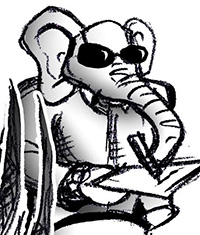In a recent dream, I was in a room with the travel writer and novelist Paul Theroux. We exchanged pleasantries. I asked him what his favorite book was. He mentioned a title that I knew, and I immediately launched into an exposition of the technical merits of the book. Then I turned the conversation over to him, asking him what he thought of the book. In response, he gave me a stare, which meant, “Who do you think you are to ask me these questions?” He then laid back and began reading the book he had been holding.
I think now that we were in a train compartment (where else would you meet the man who has made writing about train rides almost a genre in itself?) Before going to bed on the night of that dream, I had read Theroux’s Riding the Iron Rooster, an account of his train trips through China. The train of thought that Theroux had set off with his insightful passages about life in China of the 1980s had crossed over the border from the conscious to the subconscious.
 But a slight sense of indignation lingered even after I woke up. That indignation was mostly due to the fact that Theroux had been cross at me for asking a question, something he himself does a lot when traveling. His questions are not always subtle. Some cause people to bristle. But that’s the point of traveling, he says. “The non-sightseer,” he writes, “lingers, ignores the museums, asks awkward questions, fills people with alarm and despondency, and has to be deported.”
But a slight sense of indignation lingered even after I woke up. That indignation was mostly due to the fact that Theroux had been cross at me for asking a question, something he himself does a lot when traveling. His questions are not always subtle. Some cause people to bristle. But that’s the point of traveling, he says. “The non-sightseer,” he writes, “lingers, ignores the museums, asks awkward questions, fills people with alarm and despondency, and has to be deported.”
A good travel writer flirts with deportation and hugs the thin line between things, Theroux implies, in order to know a place deeply, so that he may bring back to the page something of the place that will in turn transport the reader to the place being described.
Theroux does not rely solely on questions. In China, when questioning was not practical or ran into a cul-de-sac, he employed his other great skill, trespassing, which “is a pleasure for some of us.” He drew no lines when he was in the throes of that pleasure; he only crossed lines. When women opened their handbags, he looked into them. He opened drawers in people’s houses, read their mail, rummaged through their cupboards, studied photos pasted on dashboards of taxis, noted down names of magazines people were reading, compared prices, and noted slogans and graffiti on walls. Then he completed the circle by asking “endless pestering questions.” The result was fresh reportage on China, not just obsessed with Mao’s legacy or extolling Chinese culture, but an account of what ordinary Chinese thought and felt, their habits, their lives.
Bad manners? —A necessity, Theroux explains. “I was trying to get the measure of this place [China]; but its bigness often baffled me.” The big picture is often discernible in small things. Curiosity takes a traveler deeper and further, and going deeper means not only being inquisitive but intrusive. “All views have something glorious about them,” John Updike said in his memoir, Self-Consciousness. “The act of seeing is itself glorious, and of hearing, and feeling, and tasting.” Theroux would probably say the act of peeping is glorious, and of eavesdropping, lurking and sneaking over into the private side of others, and tasting all things forbidden. “For me the best sort of travel always involves a degree of trespass,” wrote Theroux in Fresh Air Fiend. “The risk is both a challenge and an invitation.”
Voyeurs that we all are, we are not satisfied with mere superficial information. We want more. Certainly a traveler like Theroux does. “I had always associated travel books with summary, geography, explanations. It was a completely objective experience. Giving the population, statistics, the size of the cities, the texture of the city and so forth and I decided I didn’t want to do that. I wanted to write it like a novel. Dialogue. Description. And I’m not objective. I’m full of opinions, many of them probably mistaken. I wanted it to be more like a letter home.” Theroux is not the only travel writer to brazenly cross the frontiers of privacy. The eloquent Pico Iyer, while in the hallowed town of Dharamsala, is given to peeking at the e-mails of strangers and using their content in his articles and books.
Iyer, for instance, describes some of the online conversations to bring out the global character of Dharamsala, the home of the Tibetan government-in-exile. People are likely to expect Dharamsala to be – and some cling to this idea vehemently –an otherworldly town.
Iyer does talk about the occasional surrealism of Dharamsala in his book The Open Road. But he also details other ordinary aspects of the place. One time he peeks at the screen in the cubicle next to him in a cyber café, and finds an Indian man reading an e-mail from a foreign woman. It reads:
“‘I don’t feel comfortable with you,’ a woman has written to the Indian who is now beside me. ‘Why did you fall in love with me so quickly? You must meet lots of foreign tourists. We are so different. I had a dream about you last night.’”
The e-mail he has snooped has Iyer wondering:
“Is she used to such challenges? Is this the first? Do his words come out so fluently because he means them or because he doesn’t and he’s used them all before?”
He then quotes the man’s reply:
‘Yes, darling, we are so different levels as you say. You are high-class, I am only high-school. But our lives are not all so different. Today there is sun on mountain and I think of you. Rhododendron everywhere, blessings are there. When I look at the mountains I think of you, darling.’”
Snippets of conversations like these, stolen expertly, and at the hands of a writer like Iyer, become the warp and weft of his portrayal of Dharamsala. At one level is it merely an example of a dalliance between an Indian man and a Western woman, but it also reflects the larger picture of East meeting West, and the clarity and confusion such mergers bring.
Iyer’s writing is penetrative because he uses fresh imagery, unconventional examples. He is objective enough to see that Dharamsala is not just an enclave of an enigmatic Himalayan culture. He looks beyond magic and monks. He sees that it is a melting pot of people from all over the world. From this pot he ladles out the anecdotes that enrich his tale.
Questionable as opening someone’s cupboard or reading someone else’s e-mail may be morally, they are, simply, quite useful acts when it comes to evoking a place on paper. The contents of a woman’s purse and the lines of a man’s e-mail to his sweetheart who is thousands of miles away are blocks of information from which the writer can piece together a place. It is these little details that in turn help the reader better understand the place being described. Everyone wants to make a letter home intimate. After all, to convey intimacy the curtains of privacy sometimes need to be deftly parted.
Had Iyer been a gentlemen minding his own business (and computer screen), he would have missed out (and so would we) on these exchanges that are as much Dharamsala as the mantras chanted every day there in its numerous monasteries. Clues to a place’s true character, like a person’s inner secrets, are often found where we seldom look, in corners we hesitate to go toward. Bad manners are not that bad. Trespassing is merely acting out our desire to know more.










